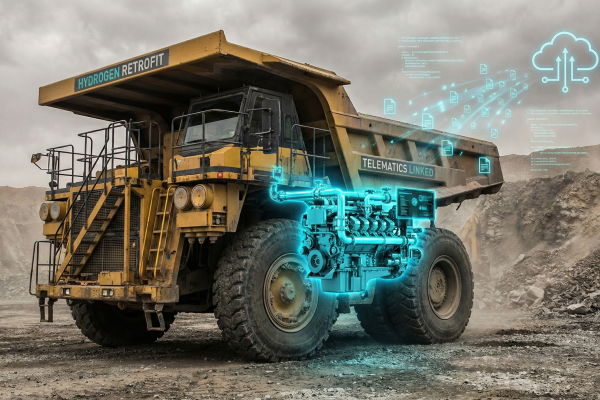January 13th, 2023 | 12:10 CET
First Hydrogen Corp., Volkswagen, Mercedes-Benz Group - Hydrogen or electric drive, who will win the race in Automotive?
Europe is gearing up for a zero-emission sweeping blow. Volkswagen and the Mercedes-Benz Group, two globally producing automotive groups, are launching the electric initiative to say goodbye to the combustion engine quickly. The Canadian company First Hydrogen Corp., on the other hand, is benefiting from its own agility and, together with its strong cooperation partners, is already in the test phase for hydrogen-powered vans on British roads. Its USP is the 360-degree solution for fleet operators. Hydrogen is ahead of battery-powered electric vehicles in terms of range - who will win the race for CO2-free powertrains in Europe?
time to read: 6 minutes
|
Author:
Juliane Zielonka
ISIN:
First Hydrogen Corp. | CA32057N1042 , VOLKSWAGEN AG ST O.N. | DE0007664005 , MERCEDES-BENZ GROUP AG | DE0007100000
Table of contents:

"[...] The VERRA certification adds credibility to dynaCERT's emission reduction technologies by demonstrating compliance with internationally recognized standards for carbon emissions reductions and sustainable development. [...]" Jim Payne, CEO, dynaCERT Inc.
Author
Juliane Zielonka
Born in Bielefeld, she studied German, English and psychology. The emergence of the Internet in the early '90s led her from university to training in graphic design and marketing communications. After years of agency work in corporate branding, she switched to publishing and learned her editorial craft at Hubert Burda Media.
Tag cloud
Shares cloud
First Hydrogen Corp. - First test drives of hydrogen LCV in the UK end of January 2023
At the currently ongoing Auto Expo 2023 in New Delhi, the future of zero-emission mobility is becoming a reality. The renowned automotive company MG is presenting its first hydrogen-powered small car there Euniq 7. The former British noble brand is firmly in the hands of the Chinese car manufacturer SAIC. MG produces cars specifically for the Chinese, Thai and Indian markets. The car runs on electric power from hydrogen fuel cells. MG has claimed a range of up to 605 km. In addition, the 6.4 kg hydrogen tank can be refueled in under 3 minutes. It is a prototype, but it shows investors which way the wind is blowing.
Therefore, a look at the Canadian company First Hydrogen is all the more valuable. The innovative company is starting to build the first hydrogen-powered van on Canada's roads with selected partners. First Hydrogen will offer a complete solution for zero-emission mobility with its innovative Hydrogen-as-a-Service. The first test runs of the hydrogen LCVs are scheduled for January 2023 with major fleet operators near Birmingham. First Hydrogen Corp. vehicles are registered for road use in the United Kingdom (UK), excluding Northern Ireland.
By providing light-duty vehicles, a guaranteed supply of green hydrogen from renewable sources, and refueling technology, the Company is actively helping fleet managers move away from fossil fuels. New on board is the German-based EDAG Group. They will develop the design and engineering concepts for First Hydrogen's first mass-market Fuel Cell Electric Vehicles (FCEVs). Using hydrogen in liquid form instead of its gaseous state would double the mileage of an automobile and allow for smaller hydrogen refueling stations.
Volkswagen - Tinkering with EV models together with Ford
Volkswagen Group is working on a new hydrogen fuel cell that could be used in a future production model. The German patent application was filed jointly by VW and Germany's kraftwerk TUBES GmbH in July 2021 and was recently published. It covers work on a hydrogen fuel cell stack and a vehicle that officials say will have a range of up to 2,000 km per charge.
Kraftwerk TUBES GmbH assures that it does not work exclusively for one brand, although this patent was filed with Volkswagen. Their goal is to use this technology in a series of up to 10,000 vehicles by 2026, distributed among several manufacturers. Volkswagen could take the lead here because of the joint application. But far from this future orientation, the specific task for the Wolfsburg-based company this year is to optimize the ID.3 EV. This includes a revision of the modular e-drive kit (MEB) platform. The MEB as a uniform vehicle platform is at the heart of Volkswagen's transformation into an e-car manufacturer.
With the ID.3 in 2023, a range of 700 km is planned with one charge in the e-car. A range of 1,300 km is still missing until hydrogen propulsion. Initial software problems of the ID.3 model are to be finally eliminated from Q4/23. Automaker Ford is also using the MEB system. Ford plans to completely convert its main plant in Cologne to producing electric cars. The first compact electric Ford is scheduled to roll off the production line there in 2023 and will be based on the VW MEB platform. Two more e-models will follow by 2024.
Mercedes-Benz Group - With platform technology to a fully configurable electric van
The Mercedes-Benz Group is reorganizing its portfolio and parting with the EQ brand. EQ represents the brand's values of "emotion and intelligence" and encompasses all essential aspects of customer-oriented electric mobility. The reason for the elimination of the EQ brand is the focus of CEO Ola Kaellenius on pure electric cars. This will make the brand redundant as Mercedes moves away from the internal combustion engine entirely. "With the goal of our parent brand Mercedes-Benz becoming fully electric by the end of the decade, we will adapt the positioning of the vehicles and thus also the use of the brand in line with the times, but it is too early for details at the moment," a spokesperson for the group said. The brand was already positioned in 2016 and launched in 2019 with an EQC SUV.
Mercedes-Benz is investing more than EUR 40 billion in battery electric vehicles (BEVs) in the coming years. From 2022, there will be BEV versions of all vehicle segments to accelerate the transformation to "electric only." To this end, Mercedes-Benz is launching three new all-electric platforms. These will ensure that customers can choose an all-electric alternative for every Mercedes model, including in the van segment. Mercedes-Benz Vans announced that it will produce and launch the new VAN.EA electric platform on three continents starting in 2025 to meet the growing demand for electric vans.
Despite the segment not being completely electric for the foreseeable future, according to Mercedes's plans, demand for these vehicles will continue to grow. "In perspective, we also want to build VAN.EA models at our sites in the US and China," Mercedes Vans CEO Mathias Geisen told Automobilwoche. "It is a global architecture."
In the US, the Sprinter is currently only produced as an internal combustion engine variant in Charleston (South Carolina). In China, they build the V-Class for the local market in Fuzhou. The German plants of Mercedes-Benz Vans are located in Düsseldorf and Ludwigsfelde. In addition, there is a plant in Spain and, in the future, vehicle production in Poland. Mercedes-Benz builds there on its own without a partner. In December 2022 Mercedes-Benz sold 48,087 vans worldwide (2021: 41,061 units), corresponding to a sales increase of 17.1%.
However, according to the Refinitiv report, the Company's full-year sales declined 1% to 2,043,900 as BEV deliveries increased 124% to 117,800. Retail sales in Asia increased by 1% to 987,800. In contrast, full-year deliveries in China fell by 1% due to local COVID measures. In South Korea, sales increased by 7% to 80,000 vehicles, while in India, they were up 41% and in Vietnam, by 19%. In Europe, retail sales increased by 1% to 635,100 vehicles in comparison. Finally, full-year deliveries in North America increased by 3% to 327,000 vehicles. The Company ended exports of cars and vans to Russia during the year.
For European automakers, the race for alternative powertrains beyond the internal combustion engine has begun. First Hydrogen Corp. is well-positioned with its world-class partners and is already in the testing phase to deploy LVCs on the roads in the UK. Their goal: to provide fleet operators with all services related to zero-emission propulsion from a single source as a Hydrogen-as-a-Service partner. Volkswagen is also focusing on cooperative ventures and is sharing its MEB platform with US automaker Ford to develop electric vehicles. Also in development at the Mercedes-Benz Group are the latest EV models. The Stuttgart-based company also wants to offer B2B customers a seamless customer experience and - like First Hydrogen Corp. - is focusing on zero-emission vans for the mobility of the future.
Conflict of interest
Pursuant to §85 of the German Securities Trading Act (WpHG), we point out that Apaton Finance GmbH as well as partners, authors or employees of Apaton Finance GmbH (hereinafter referred to as "Relevant Persons") may hold shares or other financial instruments of the aforementioned companies in the future or may bet on rising or falling prices and thus a conflict of interest may arise in the future. The Relevant Persons reserve the right to buy or sell shares or other financial instruments of the Company at any time (hereinafter each a "Transaction"). Transactions may, under certain circumstances, influence the respective price of the shares or other financial instruments of the Company.
In addition, Apaton Finance GmbH is active in the context of the preparation and publication of the reporting in paid contractual relationships.
For this reason, there is a concrete conflict of interest.
The above information on existing conflicts of interest applies to all types and forms of publication used by Apaton Finance GmbH for publications on companies.
Risk notice
Apaton Finance GmbH offers editors, agencies and companies the opportunity to publish commentaries, interviews, summaries, news and the like on news.financial. These contents are exclusively for the information of the readers and do not represent any call to action or recommendations, neither explicitly nor implicitly they are to be understood as an assurance of possible price developments. The contents do not replace individual expert investment advice and do not constitute an offer to sell the discussed share(s) or other financial instruments, nor an invitation to buy or sell such.
The content is expressly not a financial analysis, but a journalistic or advertising text. Readers or users who make investment decisions or carry out transactions on the basis of the information provided here do so entirely at their own risk. No contractual relationship is established between Apaton Finance GmbH and its readers or the users of its offers, as our information only refers to the company and not to the investment decision of the reader or user.
The acquisition of financial instruments involves high risks, which can lead to the total loss of the invested capital. The information published by Apaton Finance GmbH and its authors is based on careful research. Nevertheless, no liability is assumed for financial losses or a content-related guarantee for the topicality, correctness, appropriateness and completeness of the content provided here. Please also note our Terms of use.




